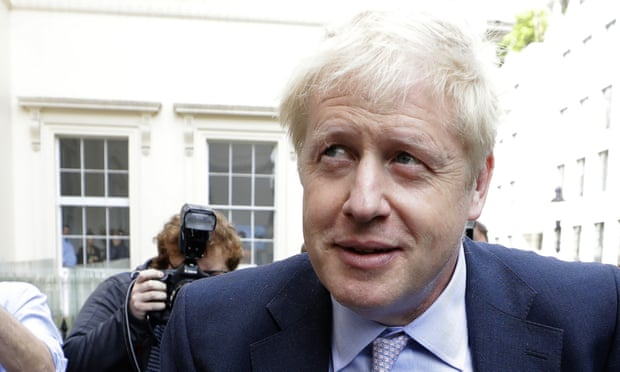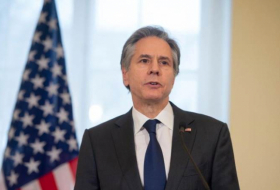The former foreign secretary declined an invitation to participate in the Channel 4 leadership debate, saying he feared it would be “cacophonous”.
But under growing pressure to submit to greater public scrutiny after Jeremy Hunt accused him of “hiding away”, Johnson said he would take part in a similar event, hosted by the BBC, next Tuesday.
Channel 4 confirmed its debate would go ahead at 6.30pm on Sunday night and a lectern would be on stage, with Johnson invited to turn up at any point and face a live studio audience of potential Tory voters.
One source working on the programme dismissed Johnson’s suggestion that negotiations had broken down, saying: “It’s classic deflection; all the negotiations were very cordial. The reason he didn’t to do it is because the format meant he would have to debate with the others.”
The BBC was delighted that it has the first major public debate involving Johnson on Tuesday night. Its format, hosted by Emily Maitlis, does not involve a studio audience and will instead see the remaining candidates take pre-submitted questions from viewers around the UK.
After Hunt invoked Winston Churchill, asking what the wartime leader would say, “if someone who wants to be prime minister of the United Kingdom is hiding away from the media”, Johnson on Friday submitted to his first broadcast interview since the campaigns kicked off.
He was at pains to soothe some of his colleagues’ fears that handing him the keys to 10 Downing Street will make a no-deal Brexit on 31 October all but inevitable.
Johnson said he would achieve an “orderly, managed Brexit” on deadline, by ditching the Northern Irish backstop in favour of “alternative arrangements”.
“I think that we can get to a situation in which we are able to leave smoothly with an orderly, managed Brexit, and that’s what we should be aiming for,” he told the BBC’s World at One. “But the only way to make sure that we convince our partners that we’re determined to get that outcome is to prepare for no deal – and I think people do understand that.”
Asked what he would do about the backstop, which he described as “that prison, that Hobson’s choice”, Johnson pointed to the Brady amendment.
Passed by parliament in January, with the support of the government, the amendment called for the backstop to be replaced with unspecified “alternative arrangements” – although the government then tried to renegotiate this with Brussels and failed.
Johnson suggested the solution could be the “maximum facilitation” approach he advocated while in Theresa May’s cabinet, from which he resigned over her Chequers deal last summer.
He added that the full details should be left to be worked out as part of the next phase of negotiations over Britain’s future trading relationship with the EU.
“The facilitations that need to be provided to enable that to take place – those should not be preordained by the backstop. They should be remitted into the implementation period for discussion after we have left,” he said.
The EU27 have repeatedly insisted on the backstop as the legal underpinning of both sides’ commitment to avoid a hard border between Northern Ireland and the Republic.
“Our friends and partners over the channel will say we can’t do this, this is a unicorn,” Johnson said. “But I think there is a solution to be arrived at in this area, and we should work hard for it.”
Opposition politicians have now raised concerns that the high number of televised debates between pro-Brexit Conservative politicians will dominate the airwaves over the summer.
Ed Davey has written to BBC director general Tony Hall to ask for a televised Liberal Democrat leadership debate, arguing that his party outperformed the Conservatives at the EU elections. He said only showing debates between Tory candidates pushing “wall-to-wall pro-Brexit propaganda” could result in the broadcaster “aiding and abetting a monstrous pro-Brexit bias which future generations might find hard to forgive”.
Hunt came second on Thursday, but with 43 votes, trailed far behind Johnson. He sought to up the ante against the frontrunner on Friday, asking, “what would Churchill say if someone who wants to be prime minister of the United Kingdom is hiding away from the media, not taking part in these big occasions?” A source in Hunt’s campaign said afterwards, “the underdog is getting hungrier”.
Johnson said, “I think it is important that we have a sensible grown-up debate. My own observation is that in the past when you’ve had loads of candidates, it can be slightly cacophonous and I think the public have had quite a lot of blue on blue action frankly over the last three years”.
As well as setting out more details of his Brexit plan, the former foreign secretary sought to burnish his liberal credentials by promising early legislation to enshrine the rights of EU citizens in law.
“There is a clear way that the now effectively defunct withdrawal agreement can be disaggregated: the good bits of it can be taken out,” he said.
Hunt’s challenge to Johnson has been hampered by the fact that moderate Tories have failed to unite behind a single “stop Boris” candidate.
The former health secretary Matt Hancock dropped out of the race on Friday. Sajid Javid, the home secretary, had hoped the pair could strike up an alliance of “change candidates”; but when they met on Thursday after the votes were counted, neither man was able to convince the other to withdraw.
Hancock will now spend the weekend weighing up whether to support Michael Gove, or simply throw his weight behind Johnson.
Johnson denied having used cocaine since a “single inconclusive event” more than 30 years ago.
The former foreign secretary, who has repeatedly appeared to dodge questions about previous drug use throughout his campaign, said he had only used the class A substance once.
Johnson described the incident as “a single inconclusive event that took place when I was a teenager and which I have extensively described”.
More about: #BorisJohnson
















































